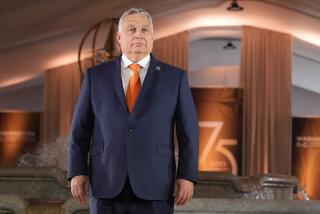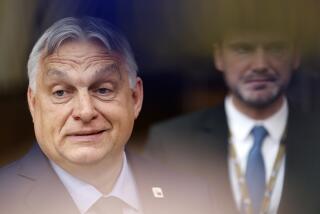EUROPE : EU’s Rotating Presidency Has Dizzying Effect on Unity Drive
- Share via
BRUSSELS — Even with luck on their side, those pushing the disparate nations of Europe toward greater unity face daunting obstacles. But after watching public support for their cause diminish and an array of economic woes swamp their political leaders, these advocates now seem to have luck against them too.
For the fifth time in just over two years, the six-month rotating presidency of the European Union has fallen to a government deep in crisis or distracted by national elections.
Italy, which officially took over the chair Jan. 1, fits both categories. Its caretaker government of technocrats--which was headed by Prime Minister Lamberto Dini, who resigned Thursday--struggles to survive. But Italy almost certainly faces elections before it hands over the reins of EU leadership to Ireland in July.
Rome even canceled the customary visit of Brussels-based news correspondents to the presidency capital for meetings in which journalists from the 15 member states traditionally quiz senior ministers about their specific goals for the six months. “We wouldn’t know who to present,” explained an official at the Italian Mission to the EU here.
Summed up the Brussels daily La Libre Belgique, “To say that this presidency begins in a surrealistic climate is an understatement.”
It is amid such uncertainty that Italy on March 29 will host the opening of a much-anticipated five-year review of the 1991 Maastricht Treaty, which commits the EU’s member states to political and economic union.
The review was initially described as a de facto constitutional convention, in which member states would commit themselves to major new steps in the direction of unity, such as a common foreign and security policy and new cooperation in judicial affairs and law enforcement. Many had also hoped the session might rekindle what advocates of deeper unity like to call “the European ideal.”
But reduced public support in many European nations, coupled with the refusal of some nations, most notably Britain, to go along with key elements of the proposed reform, has sharply reduced expectations for the conference, which could go on for up to a year.
Now Italy’s political paralysis seems to foreclose any prospect of a dynamic EU presidency salvaging more.
Other factors combine to make matters worse. Italy’s United Nations vote against French nuclear testing so outraged French President Jacques Chirac that he has decided to boycott the conference opening.
Meanwhile, signs that economic growth in Germany, the bellwether European nation, may be far weaker than forecasted, are likely to make EU leaders more cautious about floating bold new initiatives and force them to concentrate on measures to combat the region’s nagging No. 1 problem of unemployment (now 10.6% EU-wide).
Italy is only the latest in a series of weak or distracted EU presidents. Greece stumbled through its turn at the helm in the first half of 1994 with its prime minister, Andreas Papandreou, too infirm to make any of the customary calls on the national capitals. That lapse led directly to an embarrassing failure of the EU’s 15 member states to agree on a successor to outgoing European Commission President Jacques Delors.
Then there were great hopes for the back-to-back presidencies of the union’s two pivotal nations, Germany (second half of 1994) and France (first half of 1995).
But both governments ended up distracted by national elections; France labored under the additional burden of the final months in office of its physically weakened leader, Francois Mitterrand.
When Spain took the helm in the second half of last year, Prime Minister Felipe Gonzalez and his Socialist government were clearly on the ropes. But the country’s political factions agreed not to topple him during Spain’s period of leadership. They also decided to pull together on European issues. The result was an unexpectedly productive term that gave the union a much-needed boost. Last month in Madrid, EU heads of government reaffirmed their commitment to at least a limited European currency union by early 1999 and even agreed on the currency’s name: the euro.
More to Read
Sign up for Essential California
The most important California stories and recommendations in your inbox every morning.
You may occasionally receive promotional content from the Los Angeles Times.










